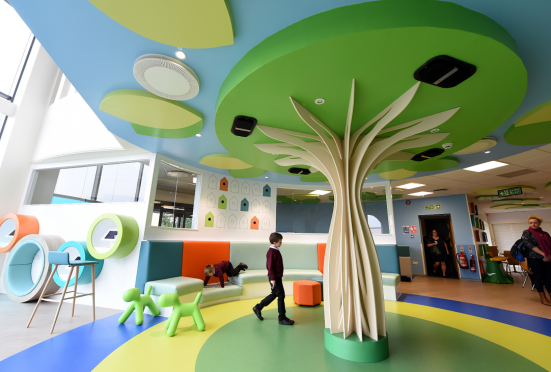Many adults are fearful about the prospect of going into hospital.
So, it’s understandable that one of the biggest complaints from youngsters at the Royal Aberdeen Children’s Hospital used to revolve around how scary it was entering the imposing building at Foresterhill.
But now, thanks to more than £200,000 of funding from offshore giant Wood Group, the hospital’s official charity, The ARCHIE Foundation, has transformed the main entrance of the RACH into a magical forest, specifically designed to calm the nerves of fearful youngsters.
The formerly prosaic reception area has been overhauled, and now comes with specially-designed speakers playing soothing woodland sounds, a safe play area and a set of iPads.
The redevelopment follows the completion of the new gardens at RACH a month ago, which has turned the area, outside the front doors, into a fantastical menagerie of topiary animals with spaces for families to relax with their sick children in a non-clinical, outdoors environment.
Both projects are part of a major step in the charity’s High 10 for ARCHIE anniversary appeal to make RACH a world-class hospital for sick kids and their families from all across the north-east, Orkney and Shetland.
But they wouldn’t have been possible without the £265,000 raised by Wood Group – the biggest donation to charity ever made by the organisation.
Bob Macdonald, the chief executive of specialist technical solutions at Wood Group and father of Alex, 7, and Fin, 4, said he had a special reason for helping to support the charity.
Mr Macdonald added: “Alex was born 6 weeks early, so we’ve got a very close connection with the hospital.
“When you arrive here, you really want it to be as easy and accommodating as possible for the kids, and everyone I’ve spoken to since the reception has been done up has been amazed at what a difference it’s made – it’s absolutely amazing what ARCHIE has done to make it such a welcoming space.
“No-one wants to consider their children being in hospital, but knowing the difference The ARCHIE Foundation has made in the north of Scotland should encourage anyone to get involved in the future.”
